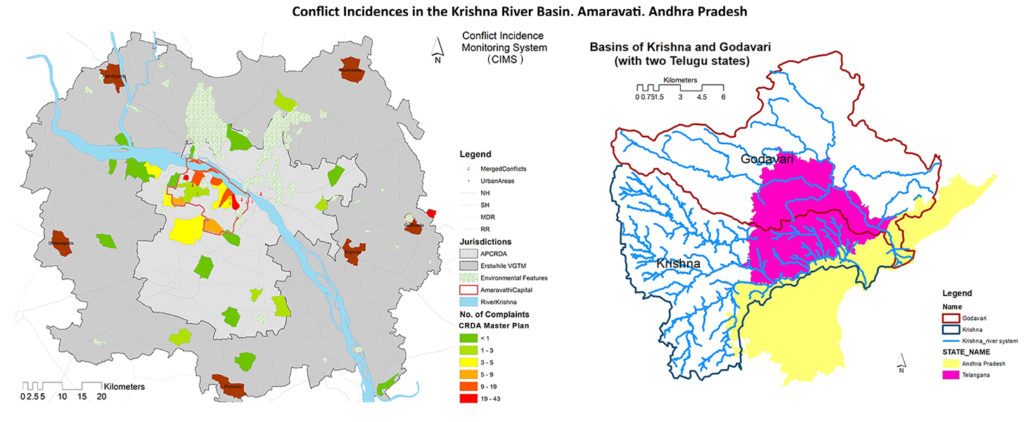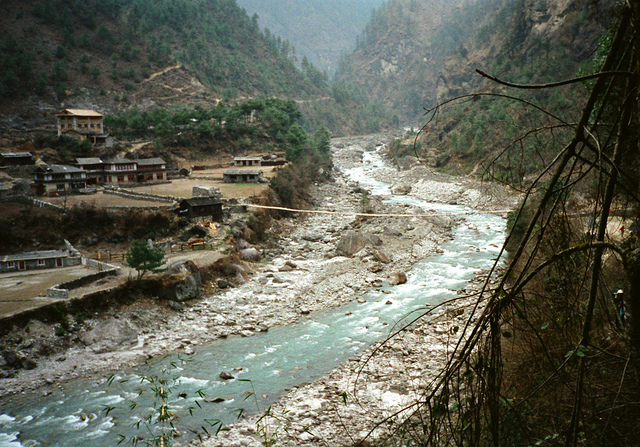Projects

TREADs programme encompasses and echoes our research and policy interests in transboundary political ecologies, river water governance and development studies. We are interested in politics and ecologies (relationships) across boundaries - after Neil Smith’s “markers of difference” - at different scales. We pursue our interests in this generic sense of transboundary political spaces, at present focused primarily on transboundary river water governance.
TREADs programme is a cluster of research projects pursuing these research interests. It builds on our earlier work on transboundary river water governance but has taken a consolidated shape with the establishment of the MoJS (Ministry of Jal Shakti, Government of India) Research Chair - Water Conflicts and Governance at CPR.
The Research Chair enables research with policy relevance, for instance, a systematic analysis of India’s interstate river water cooperation record to draw lessons for nurturing and strengthening an ecosystem for interstate river water governance in India. The Research Chair also provides the proximity and avenue for engaging with policy makers. TREADs programme builds on this opportunity to engage in an expanded scope of transboundary political ecologies, and pursues some critical research and policy questions.
- What is the nature of transboundary river water political ecologies? How does this set limits on legal adjudication? What are the other critical elements in addressing transboundary river water governance challenges?
- How does interstate river water governance in India shape transboundary river water relations in South Asia?
- Why does the Indian Constitution bar courts' (including the Supreme Court's) jurisdiction over interstate river water disputes under Article 262 of the Constitution?
- Why do the river boards in India get constituted outside River Boards Act 1956 – an Act meant for facilitating interstate river water cooperation?
- What does an ecosystem for interstate river cooperation entail: politics, policies, institutions and practices?
- What is the nature of India’s water federalism? What are the means to strengthen its federal governance of water?
TREADs cluster of projects also engage with related research interests in federalism and politics of infrastructure development (dams, roads, smart cities, etc). TREADs programme hosts TREAD Talks as part of the CPR-CWC Dialogue Forum. Please refer to the project profiles for more details. You can also reach us at treads@cprindia.org
a) The Supreme Court and interstate river water disputes
The Article 262 of India’s Constitution provides for barring the Supreme Court’s jurisdiction over interstate river water disputes. Accordingly, the Interstate River Water Disputes Act 1956 bars the jurisdiction of the Supreme Court or any other court over interstate river water disputes. Yet, the Supreme Court has had to engage with interstate river water disputes on several occasions.
The research, supported by the Ministry of Jal Shakti, Government of India explores the contours of this engagement of Supreme Court in interstate river water disputes resolution towards a definitive narrative about the underlying rationale of the jurisdictional bar. The courts’ jurisdictional bar over interstate river water disputes is also an important means to engage deeply with the dynamics of transboundary river water sharing, the political ecology of which limits the effectiveness of law and courts in resolving the disputes.
The research seeks to address the vexing policy question about how the Supreme Court has to be located in resolving interstate river water disputes. It is guided by the following hypothesis. The Supreme Court, though forced to engage with the subject, it has always been with an intent to interpret or give effect to tribunal awards. This appears to be true until the unprecedented Cauvery decision in the February 2018, in which the Court modified the Cauvery Water Disputes Tribunal award. With this decision clearing way for an invariable escalation of the disputes to the Supreme Court, the research aims to inform the policy discourse towards improved interstate river water disputes resolution.
b) Interstate river water cooperation in India
India’s interstate river water governance is dominated and determined by disputes and their resolution. The history is driven by exigencies and contingencies of disputes’ emergence and recurrence. As an outcome of this, the ecosystem for enabling cooperation is almost non-existent. Conflicts emerge when cooperation enabling mechanisms fail. This partly contributes to the long-drawn and intractable disputes. Disputes resolution itself has to build on an ecosystem for cooperation. In the absence of a resilient ecosystem for cooperation, disputes persist and recur.
In spite of an apparent non-existent ecosystem for cooperation, India has a remarkable track record of interstate river water cooperation. The Central Water Commission (CWC) has compiled 160 interstate river water agreements in 2015. Yet there is little or no work engaging with this track record - scholarly or otherwise. This is yet another reflection on how disputes dominate policy and public discourse in India. This research, supported by the Ministry of Jal Shakti, Government of India makes humble beginnings to critically engage with this track record. The larger goal is to understand why do states cooperate over river waters? Under what conditions?
This is a collaborative activity between CPR and CWC. The objective is to update the compilation towards a comprehensive repository of interstate river water cooperation in India, and produce a synthesis for informing policy thinking about an ecosystem for interstate river water cooperation.
c) CPR-CWC Dialogue Forum (TREAD Talks)
CPR-CWC Dialogue Forum is a collaborative activity between CPR and the Central Water Commission (CWC), pursued under the MoU between the Ministry of Jal Shakti (MoJS) and the CPR to establish the MoJS Research Chair – Water Conflicts and Governance at CPR.
CPR-CWC Dialogue Forum is a forum where CPR’s research interests and CWC’s practitioner perspectives converge to discuss, debate and critically engage with contemporary water policy governance challenges. It has particular interests in interstate river water disputes and transboundary river water governance.
The Forum is also a space to network and engage with wider group of stakeholders for a vibrant policy discourse. It hosts distinguished scholars, practitioners and civic society actors to share their research and experiences. These interactions are organized as talks, targeted consultations (focused on specific issues), and dissemination workshops.
The talk series organized by the Forum are promoted as TREAD Talks, after the program that the MoJS Research Chair leads: TREADs (Transboundary Rivers, Ecologies and Development studies). TREAD Talks have so far addressed variety of issues and themes. We welcome interests to share your work in this forum.
d) Water and federalism
Indian Constitution lists water as a state subject, and the executive power over water resources development and management is concentrated with the states. Though these powers are subject to centre’s powers over interstate river water regulation and development, a weak articulation and evolution of these powers have produced a condition of federal ‘tragedy of commons.’ This is manifested as water stress conditions, dangerously depleting groundwater reserves, deteriorating quality of water resources – endangering India’s long term water security.
In order to address India’s water governance challenges, the fulcrum has to be located in strengthening its federal governance of water. Towards a better understanding of this problem, the World Bank commissioned this study with CPR to explore the ‘federal leverage’ that the centre enjoys in influencing the water resource management strategies of states. An interdisciplinary team consisting of members from
Accountability Initiative and the Environmental Law and Governance have looked into the policy, legal, institutional and financial instruments at the centre’s disposal to influence and incentivize progressive policy making by states for sustainable water resource management and towards long term water security.
e) Scale, institutions and Networks II (SINets II)
CPR in partnership with The Asia Foundation (TAF) is part of the Australian government initiative - the Sustainable Development Investment Portfolio (SDIP). The SDIP’s goal is to improve water-energy-food security in South Asia, focusing on the poor and vulnerable groups in the Indus, Ganges and Brahmaputra river basins. The initiative’s key strategies include engaging with in-country institutional structures and building critical knowledge bases to improve regional cooperation over transboundary rivers in South Asia.
SINets, supported by SDIP, engages with transboundary waters policy and governance issues along three axes of interest: (a) scale – explore scalar dynamics of transboundary governance in Indus, Ganges and Brahmaputra river basins; (b) institutions – institutional models for transboundary river cooperation over interstate rivers; (c) networks – engage with state and civic society networks on issues related to transboundary governance challenges.
In its second phase (SINets II), the project focuses on the scalar dimension of transboundary governance. It explores how interstate state river water governance challenges shape and influence international transboundary issues in Indus, Ganges and Brahmaputra basins.
The Article 262 of India’s Constitution provides for barring the Supreme Court’s jurisdiction over interstate river water disputes. Accordingly, the Interstate River Water Disputes Act 1956 bars the jurisdiction of the Supreme Court or any other court over interstate river water disputes. Yet, the Supreme Court has had to engage with interstate river water disputes on several occasions.
The research, supported by the Ministry of Jal Shakti, Government of India explores the contours of this engagement of Supreme Court in interstate river water disputes resolution towards a definitive narrative about the underlying rationale of the jurisdictional bar. The courts’ jurisdictional bar over interstate river water disputes is also an important means to engage deeply with the dynamics of transboundary river water sharing, the political ecology of which limits the effectiveness of law and courts in resolving the disputes.
The research seeks to address the vexing policy question about how the Supreme Court has to be located in resolving interstate river water disputes. It is guided by the following hypothesis. The Supreme Court, though forced to engage with the subject, it has always been with an intent to interpret or give effect to tribunal awards. This appears to be true until the unprecedented Cauvery decision in the February 2018, in which the Court modified the Cauvery Water Disputes Tribunal award. With this decision clearing way for an invariable escalation of the disputes to the Supreme Court, the research aims to inform the policy discourse towards improved interstate river water disputes resolution.
India’s interstate river water governance is dominated and determined by disputes and their resolution. The history is driven by exigencies and contingencies of disputes’ emergence and recurrence. As an outcome of this, the ecosystem for enabling cooperation is almost non-existent. Conflicts emerge when cooperation enabling mechanisms fail. This partly contributes to the long-drawn and intractable disputes. Disputes resolution itself has to build on an ecosystem for cooperation. In the absence of a resilient ecosystem for cooperation, disputes persist and recur.
In spite of an apparent non-existent ecosystem for cooperation, India has a remarkable track record of interstate river water cooperation. The Central Water Commission (CWC) has compiled 160 interstate river water agreements in 2015. Yet there is little or no work engaging with this track record - scholarly or otherwise. This is yet another reflection on how disputes dominate policy and public discourse in India. This research, supported by the Ministry of Jal Shakti, Government of India makes humble beginnings to critically engage with this track record. The larger goal is to understand why do states cooperate over river waters? Under what conditions?
This is a collaborative activity between CPR and CWC. The objective is to update the compilation towards a comprehensive repository of interstate river water cooperation in India, and produce a synthesis for informing policy thinking about an ecosystem for interstate river water cooperation.
CPR-CWC Dialogue Forum is a collaborative activity between CPR and the Central Water Commission (CWC), pursued under the MoU between the Ministry of Jal Shakti (MoJS) and the CPR to establish the MoJS Research Chair – Water Conflicts and Governance at CPR.
CPR-CWC Dialogue Forum is a forum where CPR’s research interests and CWC’s practitioner perspectives converge to discuss, debate and critically engage with contemporary water policy governance challenges. It has particular interests in interstate river water disputes and transboundary river water governance.
The Forum is also a space to network and engage with wider group of stakeholders for a vibrant policy discourse. It hosts distinguished scholars, practitioners and civic society actors to share their research and experiences. These interactions are organized as talks, targeted consultations (focused on specific issues), and dissemination workshops.
The talk series organized by the Forum are promoted as TREAD Talks, after the program that the MoJS Research Chair leads: TREADs (Transboundary Rivers, Ecologies and Development studies). TREAD Talks have so far addressed variety of issues and themes. We welcome interests to share your work in this forum.
Indian Constitution lists water as a state subject, and the executive power over water resources development and management is concentrated with the states. Though these powers are subject to centre’s powers over interstate river water regulation and development, a weak articulation and evolution of these powers have produced a condition of federal ‘tragedy of commons.’ This is manifested as water stress conditions, dangerously depleting groundwater reserves, deteriorating quality of water resources – endangering India’s long term water security.
In order to address India’s water governance challenges, the fulcrum has to be located in strengthening its federal governance of water. Towards a better understanding of this problem, the World Bank commissioned this study with CPR to explore the ‘federal leverage’ that the centre enjoys in influencing the water resource management strategies of states. An interdisciplinary team consisting of members from
Accountability Initiative and the Environmental Law and Governance have looked into the policy, legal, institutional and financial instruments at the centre’s disposal to influence and incentivize progressive policy making by states for sustainable water resource management and towards long term water security.
CPR in partnership with The Asia Foundation (TAF) is part of the Australian government initiative - the Sustainable Development Investment Portfolio (SDIP). The SDIP’s goal is to improve water-energy-food security in South Asia, focusing on the poor and vulnerable groups in the Indus, Ganges and Brahmaputra river basins. The initiative’s key strategies include engaging with in-country institutional structures and building critical knowledge bases to improve regional cooperation over transboundary rivers in South Asia.
SINets, supported by SDIP, engages with transboundary waters policy and governance issues along three axes of interest: (a) scale – explore scalar dynamics of transboundary governance in Indus, Ganges and Brahmaputra river basins; (b) institutions – institutional models for transboundary river cooperation over interstate rivers; (c) networks – engage with state and civic society networks on issues related to transboundary governance challenges.
In its second phase (SINets II), the project focuses on the scalar dimension of transboundary governance. It explores how interstate state river water governance challenges shape and influence international transboundary issues in Indus, Ganges and Brahmaputra basins.
CPR in partnership with The Asia Foundation (TAF) is part of the Australian government initiative - the Sustainable Development Investment Portfolio (SDIP). The SDIP’s goal is to improve water-energy-food security in South Asia, focusing on the poor and vulnerable groups in the Indus, Ganges and Brahmaputra river basins. The initiative’s key strategies include engaging with in-country institutional structures and building critical knowledge bases to improve regional cooperation over transboundary rivers in South Asia.
SINets, supported by SDIP, engages with transboundary waters policy and governance issues along three axes of interest: (a) scale – explore scalar dynamics of transboundary governance in Indus, Ganges and Brahmaputra river basins; (b) institutions – institutional models for transboundary river cooperation over interstate rivers; (c) networks – engage with state and civic society networks on issues related to transboundary governance challenges.
The first phase of SINets (SINets I) focused on institutional models for interstate river water cooperation drawing on various instances of interstate river water cooperation in India.

The project, supported by The Asia Foundation (TAF), is has developed a framework for monitoring disputes over natural resources. This is a pilot project, and is located in the Krishna river basin in Andhra Pradesh. The project’s premise is that disputes over natural resources emerge due to gaps in corresponding policy and governance mechanisms. CIMS is a pilot project to experiment a methodology for monitoring and studying dispute incidences to draw lessons for policy making and designing institutions for better governance of natural resources.
The project has monitored three ongoing disputes over natural resources in the Krishna basin, Andhra Pradesh: water, land, and environment (flood plains encroachment). One, the conflict over interstate water sharing of Krishna river waters between Andhra Pradesh and Telangana. This includes the conflict around the linking of Krishna with Godavari river through the Polavaram project – a project given a status of “National Project” by the Union government as part of the bifurcation arrangement. Two, the land related conflicts around the implementation of the “Land Pooling Scheme” (LPS) by the state of Andhra Pradesh for building their new capital city of Amaravati on the western banks of Krishna river. Three, the environmental conflicts due to proposed Amaravati city - the encroachment of flood plains for the new capital city of Amaravati. The project has also documented disputes over other environmental issues such as the proposed de-notification of the forest land in the capital region.
The project has monitored dispute incidences over a period of four months by pursuing incidences reported in the local newspapers, television channels, social media, field visits, and other government/non-government sources. These incidences are backed by research efforts for documenting and analyzing the disputes. The project has resulted in documenting a total of 43 dispute incidences (Water-27; Land-10; Environment-6). These have been analyzed to draw implications for corresponding policies (for e.g., LPS), and institutions (for e.g., Krishna River Management Board).

The research, supported by The Asia Foundation (TAF), engages with the challenge of inclusive and informed politics in transboundary river water governance. This examines the premise that better access of nonstate actors to information leads to more inclusive politics and transboundary river water governance. The study focused on the Kosi River basin shared by India and Nepal, and looks at the politics of transboundary river water governance for flood protection.
The qualitative research involved field research in both India and Nepal in the Kosi river basin, supported by historical and secondary sources research, key informant interviews and other interactions such as focus group discussions and workshops.
The study concludes that access to information does ensure more inclusive politics and ensures effective participation of nonstate actors in transboundary governance of river waters. However, it is necessary that the information or knowledge is credible, legitimate and accountable. In the absence of this condition, the nonstate actors’ participation can be political and may produce suboptimal outcomes.
The research also addresses the larger question of what ails the transboundary governance between the two countries that fails the primary objective of the cooperation: to cope with the risk of floods in the Kosi basin. It also explores into the constructions of antagonistic politics in the respective public spheres of India and Nepal to explain the impasse over Kosi. The makes key the following conclusions and arguments. One, there is a need for revisiting the Kosi Treaty. The transborder cooperation – the institutional arrangements for transborder coordination - has reduced to preserving and managing flood protection works, and misses the larger objective of coping with the risk of disaster. The revisiting Kosi Treaty needs to be driven by this larger objective for improved flood risk management. Two, the political relations matter in ensuring effective working of the transborder cooperation arrangements. The study offers empirical evidence to support this argument by looking into the instances of 2008 floods and ‘no floods’ in 2014.
5. Megacities

The research project explores into the nature of megacities in India to articulate and address the governance challenges. The project is led by late Shri K C Sivaramakrishnan and coordinated by Dr Srinivas Chokkakula.